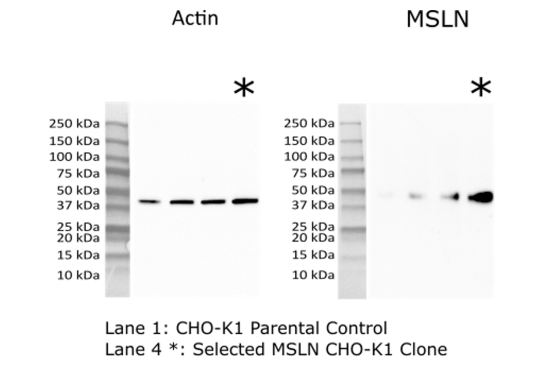Human Mesothelin – CHO-K1 Recombinant Cell Line
Recombinant CHO-K1 cells expressing cleaved, mature human Mesothelin (MSLN) gene (GenBank Accession #NM_005823.5) under the control of cytomegalovirus (CMV) promoter. This cell line was generated by limited dilution and isolation of individual clones, which were screened based on MSLN expression to obtain a high-expressing cell line.
Purchase of this cell line is for research purposes only; commercial use requires a separate license. View the full terms and conditions.
Materials Required for Cell Culture
| Name | Ordering Information |
| Thaw Medium 3 | BPS Bioscience, #60186 |
| Growth Medium 3B | BPS Bioscience, #79529 |
The cell line has been screened to confirm the absence of Mycoplasma species.
Mesothelin (MSLN) is a glycophosphatidylinositol (GPI) linked cell-surface protein that is produced as a ~70 kDa precursor protein and cleaved by Furin protease to generate the ~40 kDa mature form. MSLN is frequently over-expressed in mesothelioma, ovarian, pancreatic, and non-small cell lung cancers, while its expression in normal tissues is restricted to the mesothelial lining. MSLN is a tumor-associated antigen and has been an attractive target for targeted immunotherapy approaches, including drug-conjugated antibodies and chimeric antigen receptor T-cells (CAR-T Cells).
1. Asgarov, K., et al. (2017). A new anti-mesothelin antibody targets selectively the membrane-associated form. MAbs, 9(3): 567–577. https://doi.org/10.1080/19420862.2017.1288770.
2. Ye, L., et al. (2019). Mesothelin‑targeted second generation CAR‑T cells inhibit growth of mesothelin‑expressing tumors in vivo. Experimental and Therapeutic Medicine, 17: 739-747. https://doi.org/10.3892/etm.2018.7015



